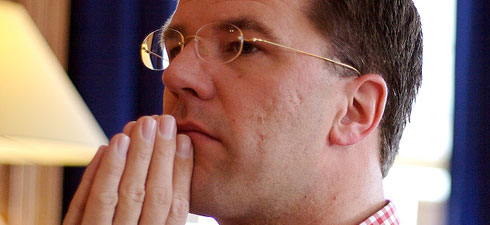With the European Elections only a few days away, Mark Rutte’s announcement that everyone should be allowed to voice whatever opinion they choose was doubtless intended as a strategic initiative to undermine extreme right leader, Geert Wilders. Rutte has now adopted the view that people should be allowed to say what they please. Even denial of the Holocaust should no longer be punished. Only incitement to commit violent acts should continue to be forbidden by law. Unfortunately for him, it is an opinion not shared by other members of his party, who believe that he has gone too far.
The leader of the VVD seems to be unaware of the fact that even his own party has defined limits for freedom of speech, and the Holocaust is one of these. As Hans van Baalen, who tops the VVD list for the European elections, pointed out, “We are liberal, but that is overdoing it.”
Freedom of speech has been in the spotlight, ever since the Amsterdam court decided to prosecute Geert Wilders. The VVD responded by putting itself forward as a defender of fundamental rights. Liberals are right to distance themselves from the double standard implicit in the position adopted by Wilders, who wants to ban the Koran, but at the same time believes that he should have the right to say whatever he wants in the most insolent manner possible. In contrast, the liberals are advocating the classic position attributed to Voltaire: everyone can say what he wants, regardless of the horror that his opinion may inspire. In short, Wilders should have the right to self-expression, but it should also apply to radical imams and neo-Nazis.
This liberal attitude, which is based on an excessive confidence in public debate, assumes that laws to limit the expression of extreme opinions do not work, because proscribed ideas will simply be propagated in secret. However, if they are freely expressed, they will naturally be contradicted by counterarguments. On this basis, Muslims and others who are offended by Wilders’ ignorant and absurd ideas, should benefit more from open debate than they do from silence imposed by a judge.
Public debate is certainly preferable to a judicial procedure, as Muslims have proved with their calm and reasoned reaction to Fitna, the anti-Islamic film produced by Geert Wilders, and the liberal view which aims to reduce the role played by criminal sanctions deserves wider support. It is on this basis that the prosecution of Wilders should be deplored, even if his ideas are grotesque and baseless. It is better to let voters make up their own minds, because their opinion carries more weight than a condemnation expressed by a judge.
But to deduce that we should completely remove incitement to hatred and discrimination from the criminal code is going too far. Public authorities would have no means of attacking agitators who preach hatred against Muslims, Jews, homosexuals or Western democracy, and who are sufficiently wily to leave the final conclusion advocating violence to the imagination of their audience. It is quite simply dangerous. To quote the famous remark made by American supreme court judge Wendell Holmes in 1919: freedom of speech legislation should not protect “a man falsely shouting fire in a crowded theatre.” Social values should also play a role; and a free society should have the right to decide that extreme ideas, like the negation of the Holocaust, have no place in civilized debate.
Free speech
"Let negationists have their say..."
In NRC Handelsblad, the historian of ideas Frank Ankersmit insists that Mark Rutte "is absolutely right: Holocaust denial should not be included in the penal code.” In support of this argument, Ankersmit cites philospher John Locke’s A Letter Concerning Toleration, written to defend the cause of religious freedom. For Ankersmit, the text, which was published in 1689, provides the basis for laws on free speech, and is still relevant today because: “By definition, opinion cannot be imposed by law.” He also takes the view that it is dangerous to impose penalties on negationists: “Let (them) openly express their revolting point of view, so that we know who they are […] If we force them to express themselves in secret, we will be ignorant of the existence of dangerous opinions in our society. In prosecuting negationists, we are ignoring the need to take issue with their beliefs.”
Do you like our work?
Help multilingual European journalism to thrive, without ads or paywalls. Your one-off or regular support will keep our newsroom independent. Thank you!
















